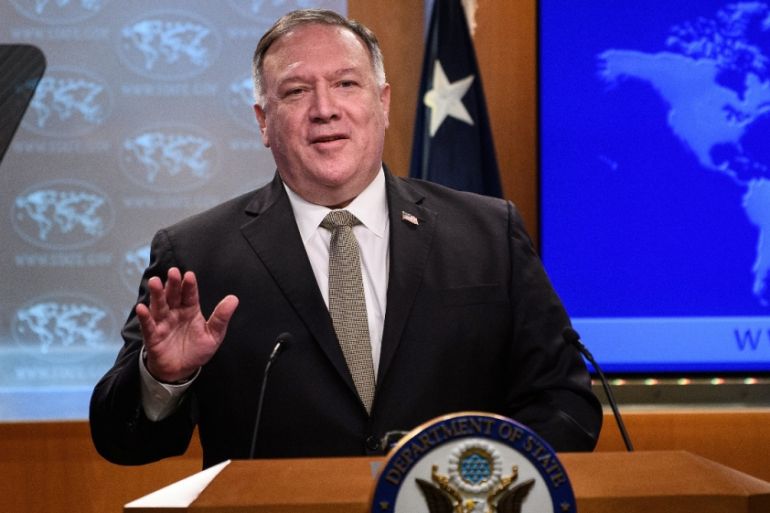US further restricts Chinese diplomats travel, meetings
The US says Chinese diplomats will need approval to visit US universities and hold cultural events.

The United States has said senior Chinese diplomats will now be required to secure State Department approval before visiting US university campuses and holding cultural events with more than 50 people outside embassy grounds in a move that drew condemnation from Beijing.
Washington has cast the move as a response to what it said was Beijing’s restrictions on American diplomats based in China. It comes as part of a Trump administration campaign against alleged Chinese influence operations and espionage activity.
The State Department said it also would take action to help ensure all Chinese embassy and consular social media accounts were “properly identified”.
“We’re simply demanding reciprocity. Access for our diplomats in China should be reflective of the access that Chinese diplomats in the United States have, and today’s steps will move us substantially in that direction,” US Secretary of State Mike Pompeo told a news briefing on Wednesday.
Rising tensions
The Chinese Embassy in Washington condemned the move as a “gross violation” of Vienna Conventions that govern diplomacy.
The US should “correct its mistakes, revoke the relevant decisions, and provide support and facilitation for Chinese diplomats in the US to carry out the relevant activities,” the Global Times, a state-run tabloid, reported the embassy as saying.
The US has been taking steps to restrict Chinese activity in the country in the run-up to the November presidential election, in which President Donald Trump faces a strong challenge from Democratic challenger Joe Biden and where he has made a tough approach to China a key foreign policy platform.
Relations between the two countries continue to deteriorate amid disputes over trade, Taiwan, Tibet, human rights, Hong Kong and the coronavirus pandemic.
Trump has blamed China for failing to adequately respond to the COVID-19 outbreak, which began in the Chinese city of Wuhan late last year.
The US has recorded the most cases and deaths in the world and Trump’s handling of the pandemic has become a key campaign issue after the president pushed for a lifting of restrictions designed to curb the spread of the virus.
Despite Trump’s previous affinity for Chinese President Xi Jinping, his administration has been ratcheting up up restrictions and sanctions on Chinese officials, government agencies and companies since last year, beginning with travel limits imposed on diplomats, and registration requirements for Chinese media outlets.
In June, the US ordered China to close its consulate in Houston, Texas, which prompted Beijing to force the closure of the US consulate in Chengdu.
University ‘threats’
Pompeo on Wednesday also revealed that Keith Krach, the State Department’s under-secretary for economic erowth, had written recently to the governing boards of US universities alerting them to alleged threats posed by the Chinese Communist Party.
“These threats can come in the form of illicit funding for research, intellectual property theft, intimidation of foreign students and opaque talent recruitment efforts,” Pompeo said.
He said universities could ensure they had clean investments and endowment funds, “by taking a few key steps to disclose all (Chinese) companies’ investments invested in the endowment funds, especially those in emerging-market index funds.”
On Tuesday, Pompeo said he was hopeful Confucius Institute cultural centres on US university campuses, which he accused of working to recruit “spies and collaborators”, would all be shut by the end of the year.
Last month, Pompeo labelled the centre that manages the dozens of Confucius Institutes in the US “an entity advancing Beijing’s global propaganda and malign influence” and required it to register as a foreign mission.
The State Department announced in June it would start treating four major Chinese media outlets as foreign embassies, calling them mouthpieces for Beijing.
It took the same step against five other Chinese outlets in February, and in March said it was slashing the number of journalists allowed to work at US offices of major Chinese media outlets to 100 from 160 due to Beijing’s “long-standing intimidation and harassment of journalists”.